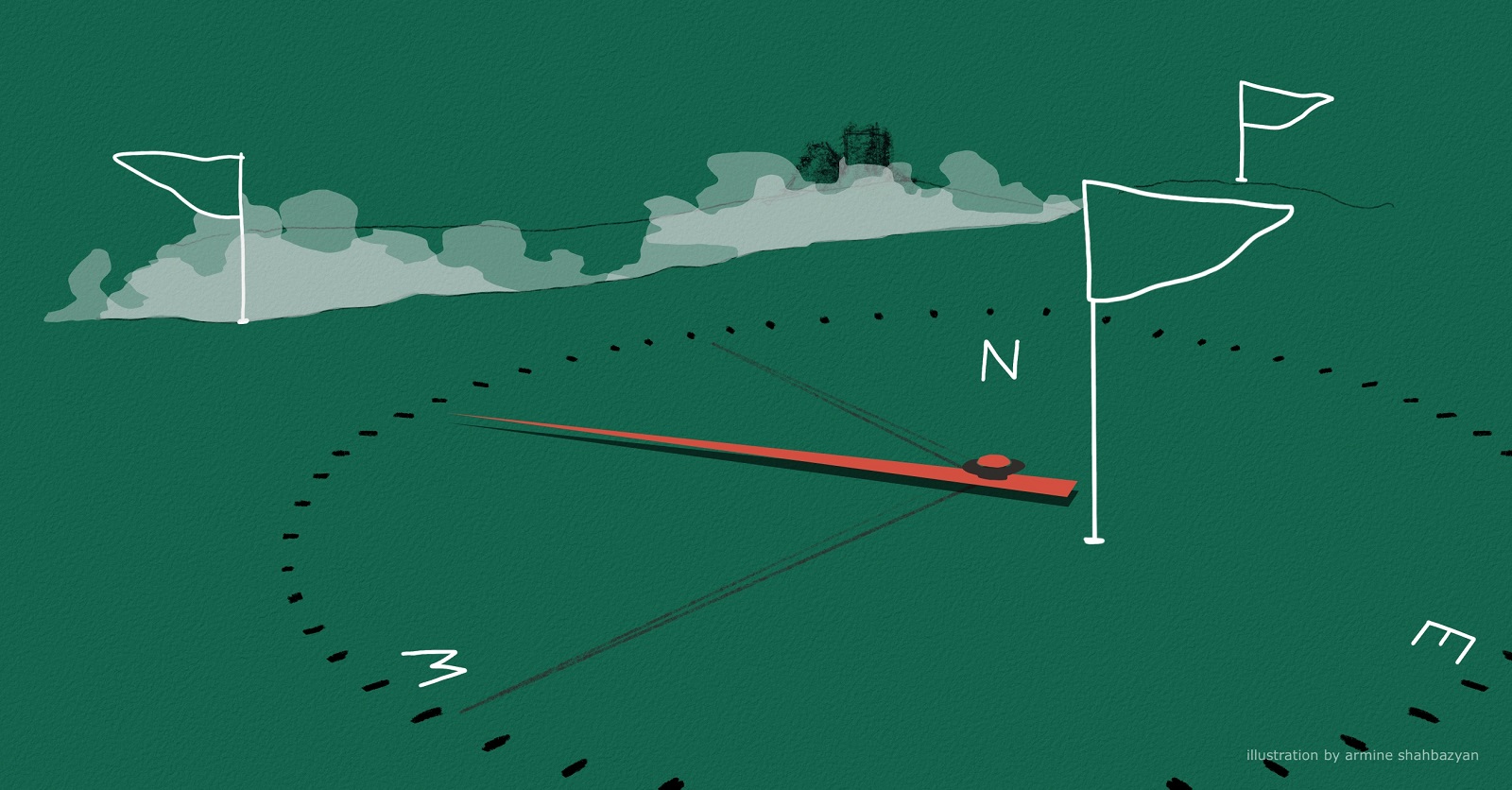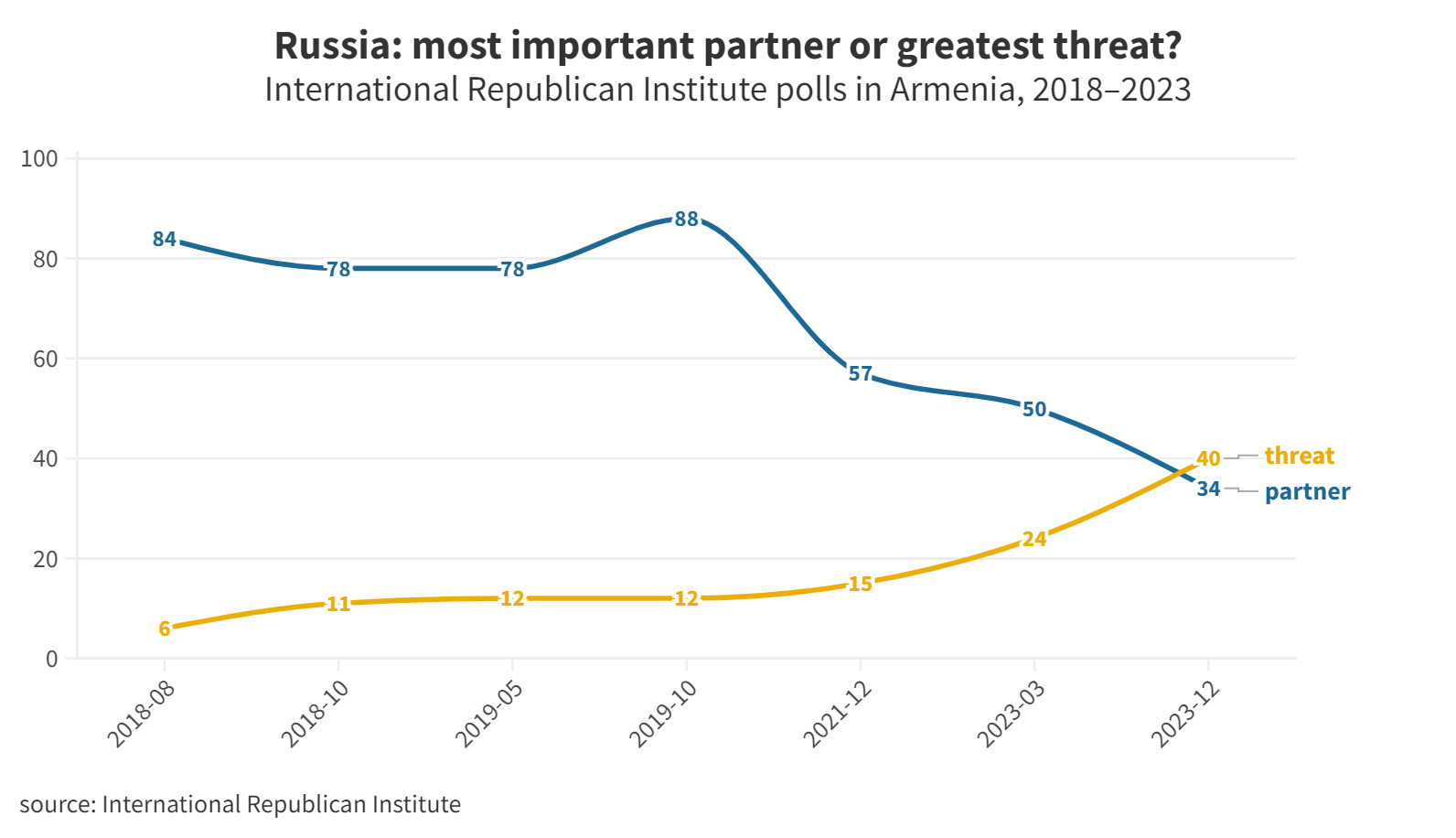
Going forward, all English language articles on EVN Report will have audio versions.
Listen to the article.
The International Republican Institute’s (IRI) latest survey in Armenia, conducted in December 2023, reveals the consolidation of public distrust in erstwhile ally Russia, robust support for the Government’s pivot toward the West, and a growing sophistication in the Armenian public’s understanding of its complex security concerns. At the same time, consistent growth in the public’s trust of state institutions is observed, with important indicators for democratic resilience amidst a persistent security crisis.
Is the Country Headed in the Right Direction?
In a surprising show of confidence, in the complex security dilemma that Armenia finds itself in, half of the respondents said they believed Armenia, generally speaking, is heading in the right direction. This is an exponential increase from the 36% positive trajectory in the previous survey from March 2023 and the 31% from the June 2022 survey. Contextually, this is the highest share in the six IRI surveys conducted since 2021, as the majority of Armenian society, for the first time since the 2020 Artsakh War, qualifies the direction of the country to be on a positive trajectory. Comparatively, 39% believe the country is heading in the wrong direction, which is a 12% drop from the 52% negative response from March. When disaggregating the data, and utilizing comparative cross-sectional analysis, four important developments stand out:
- In the March survey, 63% of those in the age group of 18-35 noted that the country was heading in the wrong direction, whereas in the recent survey, this age group’s negative response dropped by 17%, indicating an important demographic shift among the more pessimistic social grouping within the poll.
- Approval of the country’s direction increases with age. Among 30 to 49-year-olds, there is a 46% approval rate, while those aged 50 and older show a higher approval rate of 55%. The older the age group, the higher the directional approval of the country: the positive correlation points to the consistency of the legacy of the Velvet Revolution. Namely, the robust economic growth that Armenia has experienced in the last three years is heavily reflected in the younger age groups, not the older one; however, the positive perceptivity of the older age group far supersedes that of the younger age groups. In this context, the “economic growth argument” does not sufficiently explain the positive perceptivity, as the younger age groups, who directly benefit from the economic boom, are not as optimistic as the older age group that is on the lower receiving end of the economic boom. Contextually, this attests to the strength of the current Government’s approval with the older electorate of society, which, by extension, remains the electoral base of the ruling party.
- There was an observable change in the directional vote for the country based on gender. Whereas in the March survey 34% of women and 39% of men noted a positive trajectory, this shifted to 50% positive trajectory for men and 49% for women. Female approval increased by 15%, closing the gap with male approval. Provisionally, the data suggests immense improvements with the female public.
- When considering the urban-rural divide, the positive trajectory was highest with rural respondents at 54% — a 17% increase from March — while the urban positive response stood at 51%, an increase of 13%. Conversely, while Yerevan’s positive trajectory increased from 34% to 44%, it still remains exponentially lower from the rural vote and the urban vote outside of the capital. This, in turn, supports the postulate noted in point #2: The most affluent part of the country displays the more pessimistic response, while the poorest sections of the country display, in relative terms, the more optimistic response.
Security Concerns High
Prompted by continued bellicose rhetoric from Azerbaijan, national security and “border issues” top the list of Armenia’s main problems with 47% of respondents naming it in their combined responses. It is more than twice as much as those naming the economy and unemployment (23%) as a main problem. However, when compared to the previous results from the March survey, security concerns have dropped by 13%, as 60% had named national security and “border issues” as a main problem. When applying cross-sectional analysis to this phenomenon, an important interrelationship is observed between the security crisis prompted by the ethnic cleansing of Artsakh and the general public perceptions on security.
While Azerbaijan’s takeover and complete ethnic cleansing of Nagorno-Karabakh (Artsakh) is seen, at 36%, as the government’s biggest failure of the last six months, 73%, however, noted satisfaction with the government’s handling of the subsequent refugee crisis. This demonstrates a growing sophistication in the Armenian public’s understanding of the security environment. Namely, while the loss of Nagorno-Karabakh is deemed the biggest failure of the Government, respondents do not punish the Government for this failure, but rather, demonstrate approval of how the Government handled developments after this failure. In this context, the loss of Nagorno-Karabakh neither affected the positive perceptivity of the country’s direction nor the Government’s performance in dealing with the crisis. Generally speaking, when society disapproves a government’s policy or approach, it subsequently punishes or consistently disapproves the consequences that such policies bring about. In this instance, the Armenian public displays a very sophisticated understanding of the security dilemma: while they note the loss of Nagorno-Karabakh as the top failure of this government, they refrain from viewing the government as responsible for the outcome. More so, the outcome of the loss of Nagorno-Karabakh, which was the refugee crisis, is actually qualified by the public as a case of success in the way the Government dealt with it. The explanatory variables for this may be numerous, ranging from the public’s inclination to attribute blame to Russia to the recognition that Armenia currently lacks the capability to address the issue through force. However, it’s important to note that these factors, for now, fall beyond the scope of the available survey data. Nonetheless, one thing that the survey results demonstrate is that Armenian society has developed a nuanced, complex understanding of the difficult security environment that it finds itself in.
Government Approval
Prime Minister Nikol Pashinyan remains the most trusted politician with 17%, a 3% increase from March, while Foreign Minister Ararat Mirzoyan stands at 5%; 60% of respondents trust no one, a 4% improvement from March, when 64% trusted no one. Support for the Prime Minister’s Civil Contract party hovers around 23%, while support levels for the illiberal opposition, and their affiliated political parties, have completely collapsed, with numbers hovering in the 3% range across the board.
In a separate question on Pashinyan’s approval, 50% of respondents said they are very or somewhat satisfied with the work of the Prime Minister’s office versus 48% who are dissatisfied. This is a significant improvement since March 2023, when 37% were satisfied and 61% dissatisfied. The Prime Minister’s increase in approval ratings is positively correlated with the 50% approval of the direction that the country is going, and in this context, the Office of the Prime Minister, within a nine month period, has observed an increase in approval ratings of 13%. When qualified within the context of the security crisis, stagnation in the peace process, loss of Nagorno-Karabakh, and the subsequent refugee crisis, the increased approval of the Prime Minister’s job performance remains a striking, yet anomalous development, especially considering the fact that the 50% approval mark is actually the highest since the 2020 Artsakh War.
The Armed Forces regained their status as the most trusted institution, with 64% of respondents noting satisfaction, a significant increase from the 40% approval in March 2023. The police came second at 62%, with a 4% improvement over March. The National Security Service also noted an increase in its institutional approval, going from 45% in March to 53%. Collectively, the institutions of Armenia’s security sector demonstrated robust increases in approval within the nine month period. The most important development, however, with respect to institutional approval, was the 7% increase in the approval of local governments, which is an important indicator for decentralization and efficacy of governance for areas outside of Yerevan. In this same light, the increase of 6% for the Central Election Commission, from 46% to 52%, is a crucial indicator for the growing institutional trust in Armenia’s democratic institutions.
Across the board, the survey demonstrated improvements in public approval for directions in foreign policy, healthcare, fight against corruption, economy, human rights, democracy and national security. In the case of the latter two, perceptivity on democracy increased by 4%, while on national security, it increased by 6%. Comparatively, the highest increases were on foreign policy, an increase of 9%, and economy, an increase of 7%. Conversely, the Government’s biggest and only shortcoming, and the only segment underwater, is education, with a decrease of 7%
Foreign Policy Trends
In the collective survey results, the most significant shifts are observable in the area of foreign policy, both in the substance and direction that the country’s foreign policy orientation is taking. Armenia’s new foreign and security policy of diversification was considered by respondents as the biggest success of this Government, thus offering a robust vote of confidence for Yerevan’s pivot away from Russia.
Most notably, Russia’s reputational decline intensified as for the first time in recent history more respondents viewed it as a political threat, at 40%, than a partner at 34%. A staggering 66% evaluated Armenia’s relations with Russia as bad, with only 31% rating it as good. This is an immense collapse from the 50% positive and 49% negative from March. When lagging the data by two years, the numbers are even more staggering: in the December 2021 survey, 64% gauged relations as being positive, while 34% qualified it as negative; in two years, the numbers are exactly the inverse, with 66% gauging it as negative and 31% as positive.

Even more, Russia is seen as the greatest economic threat to Armenia at 51%, on par with Turkey at 54% and Azerbaijan at 50%. This is likely in anticipation of possible Russian economic retaliation against Armenia’s closer ties with the West. In yet another sign of the growing distrust toward Russia, Russian media outlets are now viewed as untrustworthy by 61% of respondents and are trusted only by 28%.
With the high-profile cooperation with France, especially in defense, Paris has assumed the status of Armenia’s top political partner, dwarfing Russia’s long-held role in this area. 96% of respondents said Armenia-France ties were good, with 66% rating them as “very good.” 61% named France as Armenia’s most important political partner, ahead of the United States (56%), Iran (47%), and the EU (37%). France also came first as Armenia’s most important security partner (50%), ahead of Iran and the U.S. (both at 46%).
India, another key defense partner, was not included in the list of security partners, but overall ties with that country were rated as good by 93% of respondents, coming behind only France. Ties with the U.S. and EU were also rated highly, at 89% and 87%, respectively. Similarly, ties with neighbors Iran and Georgia are also seen positively at 88% and 82%.
When applying trend analysis, four important observations stand out:
- U.S.-Armenia relations have held steady and in the 80% range, on average, since the Velvet Revolution, with the exception of a short period during the post-2020 War period. The 89% positive response in this survey, however, remains the highest, thus indicating not only the growth but also the consolidation of American soft power in Armenia.
- Similarly, EU-Armenia relations continue on a very strong trajectory since the Velvet Revolution, with the exception of the post-2020 War period. France’s exceedingly high ratings at 96% remains commensurate with the collectively high approval for Armenia’s Western partners.
- Armenia’s relations with its non-Western partners also remains very strong, with India at 93%, Iran at 88%, Georgia at 82% and China at 78%. In this context, Armenia’s diversification of its foreign and security policy, and its directional pivot away from Russia have actually enhanced, collectively, its public’s positive perception towards non-Western partners.
- Not only has Russia joined Turkey and Azerbaijan in its negative approval ratings within Armenian society, but just as interestingly, for the first time, Armenians consider relations with Ukraine to be stronger and more positive than that with Russia.
Examining the Context
Podcast
Examining the Context: Armenia’s New Hard Power Capabilities: Navigating Defense Procurement
To strengthen and democratize its defense sector, Armenia needs to diversify access to armaments and advanced weapons systems and develop a comprehensive, well-structured and expert-driven procurement program. EVN Report’s Maria Titizian speaks with the author of “EVN Security Report” Dr. Nerses Kopalyan about the February 2024 security briefing.
Read moreSee the EVN Security Reports
Politics
How Azerbaijan Deceives and Harasses the International Community
Azerbaijan has been using military and diplomatic coercion to achieve its maximalist and expansionist objectives, employing wide-ranging tools of hybrid war while also deceiving and harassing international actors. Sossi Tatikyan explains.
Read moreEnclaves Enter Armenia-Azerbaijan Peace Talks
The issue of tiny but strategically placed Soviet-era enclaves in Armenia and Azerbaijan has come to the forefront of peace talks in recent months. Hovhannes Nazaretyan maps it out.
Read moreHypocrisy and Mystification: Azerbaijan in the Non-Aligned Movement
The Non-Aligned Movement is a diplomatic platform where Azerbaijan, as a major oil-producing nation, tries to exert influence by supporting ex-colonies that are purportedly fighting colonialism. Garren Jansezian explains.
Read moreOpinion
Lenin in the Periphery: Self-Determination and Its Discontents
Over 30 years ago, a statue of Lenin towered over the heart of Yerevan until it was dismantled. The recent centennial of Lenin’s death went mostly unnoticed in Armenia but it might have sparked reflection on Lenin’s impact during the Sovietization of Armenia and how his definition of self-determination has had consequences on contemporary geopolitics.
Read moreBetween State and Fatherland: A Tale of Two Mountains
Mount Ararat doesn't stand as an obstacle to building a functional state, and suddenly loving Mount Aragats will not help us achieve our goals. Before we jettison our national symbols en masse, we need concrete plans and state-driven programs to improve the lives of an already beleaguered nation, writes Daniel Tahmazyan.
Read moreCyber Operations and International Law
In the ever-evolving landscape of modern warfare, the significance of cyber operations has grown significantly, providing nations with additional means to project power, exert influence and secure strategic advantages. Davit Khachatryan looks at the contemporary nature of conflicts in the digital age and their adherence to the foundational principles established by the UN.
Read more







